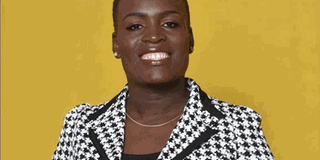‘Sitanyamaza’ breaking the silence for Kibra women

Ms Editar Ochieng', founder, Feminist for Peace Rights and Justice Center. She has vowed to break the silence and free girls in Kibra slum from sexual violence. PHOTO | POOL | NATION MEDIA GROUP
Ms Editar Ochieng’ grew up in a society where women and girls who were sexually abused suffered in silence.
She had been accustomed to believe that speaking against the crime was taboo.
It was not until 2010 when she realised patriarchy was behind the silencing of women and girls in honour of male power.
From then on, the 32-year-old vowed to break the silence and free girls in Kibra slums, Nairobi County from the oppression.
Ms Ochieng’ had been recruited into a Sitanyamaza project by a local non-governmental organisation, through which Kibra girls and young women were educated on speaking against sexual violence.
The project, which ran from 2010 to 2011, opened her eyes as she was exposed to painful experiences of women and girls who had suffered for years in silence.
They had interactive sessions where girls and women would freely share their experiences.
"I realised many girls and women were being abused sexually but lacked the space to share their experiences and seek counsel," she says.
"And this silence encouraged men to take advantage of them even more. They would even share the girls."
TOUGH LIFE
Ms Ochieng’ started to read about feminism and loved the concept of radical feminism which demands for elimination of male supremacy in all social and economic contexts.
It matched her zeal to end oppression of women and girls in Kibra.
In 2016, she founded Feminist for Peace Rights and Justice Center as well as Kibera Young Women Network.
The centre focuses on sexual and reproductive health rights advocacy and educates women and girls on related rights and how to access the services.
Her joy is that girls and young women are now seeking contraception without feeling the pressure of being stigmatised because they understand it’s their right.
On the other hand, the network holds the leadership accountable to protecting the rights of young women in the slum.
“It's a tough life for a girl in Kibra,” she says.
“Men capitalising on girls' lack of basic needs to exploit them sexually defines the growing up of a girl in Kibra.”
“I am working to change the status quo. I want a safe space for every girl and woman," she concludes.
On the brighter side, Ms Ochieng' is in the frontline fighting Covid-19 and assisting the most vulnerable cope with its socio-economic challenges.
PERSONAL HYGIENE
Together with the young women network, they have been creating awareness about the spread of the contagious disease and preventive measures therein.
"We realised women were buying myths that they cannot contract the disease because they are Africans and to some extent, they were normalising the situation," she says.
She was fortunate to receive a donation of three water tanks from the National Coalition of Human Rights Defenders for Kisumu Ndogo, Kibra residents. These, according to her, have boosted personal hygiene among the children and women.
Again with the support of other partners, her organisation has since late April, supplied a weekly food package to 100 women including survivors recovering from sexual and gender-based violence and those who had lost their domestic work jobs.
DOMESTIC VIOLENCE
Amref Health Africa also donated to her 750 packets of sanitary towels, which she has distributed to the vulnerable girls through young women leaders from the 14 villages in Kibra.
She has also been distributing books from her organisation library to children who are now home due to school closure, to study from home. These efforts have, however, hit a rock due to sparks of domestic violence in these homes.
"Most of the children complained that 'my father is not giving us peace of mind at home,' '' she says.
Currently, she has adopted a coaching strategy through some young men who have volunteered to teach the children for free.





